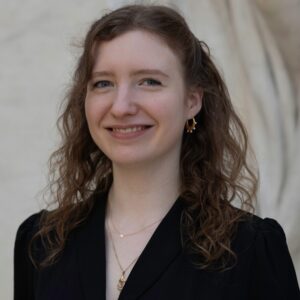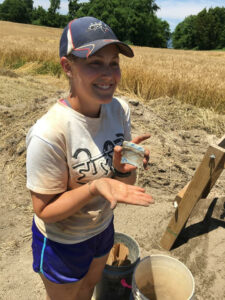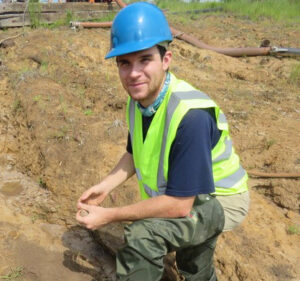
SBR Student Conference Travel Award
The Student Conference Travel Award is intended to assist undergraduate or graduate students to travel to a national or international conference to present a paper on a topic concerned with research on archaeological or historical ethnographic beads or beadwork. The award is for $750 and the applicant must be enrolled in a BA, MA, or PhD degree-granting program anywhere in the world. Papers written during a student’s last term will also be considered provided the paper is presented at a conference within one year of graduation and that the person does not have an academic position. Applicants also need to be a current member of the Society of Bead Researchers. (https://beadresearch.org/membership)
To apply for the award, you must submit the following:
1) Title and abstract (300 word limit) of your presentation;
2) Letter of acceptance from the conference where you plan to present the paper;
3) A brief statement outlining how your presentation expands our knowledge of beads and their role in society, and how your participation in the conference will be beneficial to your career and future research; and
4) Your CV, including your contact information, and the name and email of your faculty advisor.
Send the above material to Karlis Karklins (karlis4444@gmail.com), head of the Awards Committee. Applications may be submitted at any time.
The awardee will be selected by the Executive Committee of the SBR on the basis of originality, scholarship, and relevance to the overall mission of the SBR (https://beadresearch.org/about-us/).
Applicants will be notified about the results of the award competition as soon as possible after the committee meets to evaluate the applications. Monies will be awarded upon successful presentation of the conference paper.
The applicant will provide a short report on their paper detailing the paper/conference for the SBR’s newsletter The Bead Forum within one year of receiving funds.
Award Winners

Miriam-Helene Rudd, a recent graduate of the Winterthur/University of Delaware Program in Art Conservation, is our latest award recipient. Her paper, “Approaches to the Stabilization of Beadwork,” was presented at the 15th Biennial North American Textile Conservation Conference held in Banff in September of 2025. It provides an overview of the current approaches to beadwork stabilization including examination, documentation, and treatment. The care and treatment of beadwork has been periodically addressed in conservation literature, but stabilization methodologies had not been previously compiled. This paper is the culmination of an independent study conducted during graduate studies in objects and textiles conservation. Consultations and a literature review were conducted, detailing the treatment of a beaded garment by designer Ann Lowe that was presented as a case study.
Julian Hirsch, a Ph.D. candidate in Archaeology at The Hebrew University of Jerusalem, is our third travel award recipient. His paper, “The Ritual Lives of Carnelian Beads in Late Chalcolithic Context,” was presented at the ASOR Annual Meeting held in Boston in November of 2024. It proposes that three cloth bundles containing hundreds of carnelian beads and thousands of glazed steatite beads, uncovered in The Cave of the Skulls in the Judean Desert of Israel, attest to the curation of these beads both during the time of their use, and with regards to their specialized deposition. As few carnelian beads can be found elsewhere in the Late Chalcolithic, the paper argued that The Cave of the Skulls was, in fact, understood as the sole “proper” place in the southern Levant for “retiring” these ornaments.


Rebecca Webster, a doctoral student in the Anthropology Department at the University of Tennessee, Knoxville, is our second award recipient. Her paper, “Peake, Wampum, or Sewant?: An Analysis of Shell Bead Terminology in the Seventeenth Century Chesapeake,” was presented at the 53rd Annual Meeting of the Society for Historical and Underwater Archaeology held in Boston in January of 2020. It was awarded runner up of The Jamie Chad Brandon Student Paper Prize at the conference. The presentation provided a statistical analysis of 102 historical documents from Maryland utilizing bead terminology from 1634 to 1763. By using a statistical approach, Webster was able to demonstrate the association between context of use, peoples involved in documented uses of terminology, and changing understandings of indigenous and European identity during the 17th and 18th centuries.
Our first award recipient is K. Pierce Wright, a master’s student in the Anthropology Department, The University of Alabama, Tuscaloosa. His winning paper, “Beads and Bohr Models: Using XRF to Discuss Choctaw Identity Formation,” was presented at the 84th Annual Meeting of the Society of American Archaeology held in Albuquerque, New Mexico, in April of 2019. It presents the results of an x-ray fluorescence (XRF) study to examine European glass trade beads from two Chickasawhay Creek Sites in Kemper County, Mississippi. Together, these two sites present a unique opportunity to examine Choctaw ethnogenesis. By using a practice-based approach, this paper discusses the application of chemical characterization analyses in bead studies to establish more accurate dates of occupation, discuss body adornment and identity, and examine Choctaw-French interaction during the 18th century.
